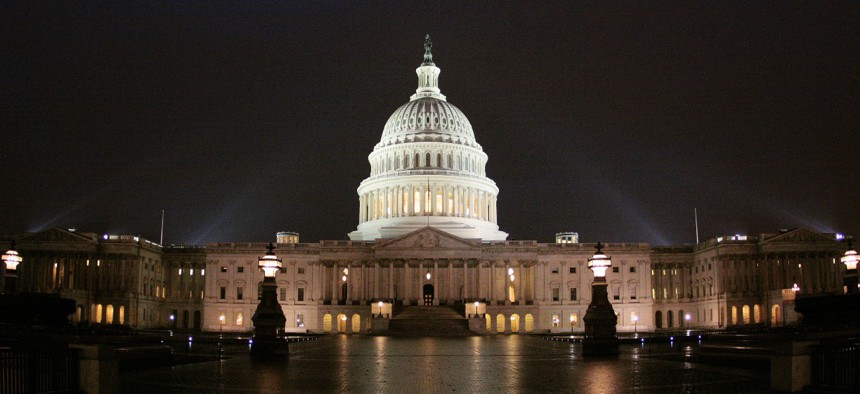Senate approves a stopgap spending measure, delaying the shutdown threat by one week

The CR delays a shutdown by one week, giving lawmakers a chance to pass a longer-term spending package. Phil Roeder / Getty Images
Lawmakers will now turn their attention to finalizing a full-year omnibus measure.
The Senate on Thursday approved 71-19 a one-week stopgap funding bill, sending the measure to President Biden’s desk and avoiding a shutdown for one week.
Lawmakers successfully bought themselves time until appropriators can draft and Congress can pass a full-year omnibus funding measure for fiscal 2023 after negotiators struck a bipartisan deal on a framework Tuesday evening. Absent congressional action, funding would have expired and agencies would have been forced to shutter after Friday. The new measure resets that deadline to Dec. 23.
The measure cleared the Senate after some tense 11th-hour discussions, as it required unanimous agreement to receive expedited consideration. Several senators said this week they objected to the continuing resolution and they were considering voicing that from the Senate floor, which would have effectively caused a short shutdown.
Instead of disrupting the process, however, the senators agreed to allow it to move forward in exchange for certain amendment votes. Some Republicans had pushed for a lengthier CR, which they said would create the dual benefit of giving lawmakers more time to read the omnibus and their party more leverage in negotiations after it takes control of the House next year. The Senate ultimately rejected an amendment to do just that, as well as one to eliminate funding for the Internal Revenue Service that Democrats provided as part of the Inflation Reduction Act.
House Republicans similarly objected to the CR on Wednesday after Minority Leader Kevin McCarthy, R-Calif., advocated against it.
Lawmakers must still negotiate the details of the bill to set line-by-line funding for every agency in government, but Tuesday’s deal allows appropriators to begin writing the measure in a bipartisan fashion. Prior to the announcement, appropriators had yet to settle on the top-line funding level and the breakdown for defense and domestic spending that is necessary before they could write an omnibus. The Senate this week is expected to pass the annual defense authorization bill, which would set defense spending for the year at $858 billion. That would mark about a 10% increase.
Democrats have pushed for an equal increase for non-Defense spending, but Republicans have called that a non-starter, citing the major spending the majority has passed through the reconciliation process. Senate Minority Leader Mitch McConnell, R-Ky., said Republicans would only agree to a non-defense spending increase that would bring the total price tag for the omnibus up to the level proposed by President Biden in his fiscal 2023 budget.
Lawmakers did not disclose the funding levels they agreed upon for their framework. Democrats had said they would vote this week on an omnibus bill they were writing without direct Republican input, but scrapped those plans after making progress on a bipartisan deal over the weekend. Rep Rosa DeLauro, D-Conn., the top Democratic appropriator, stressed there is still a significant amount of work outstanding.
“We have a framework that provides a path forward to enact an omnibus next week,” she said. “Now, the House and Senate Appropriations Committees will work around the clock to negotiate the details of final 2023 spending bills that can be supported by the House and Senate and receive President Biden’s signature.”
Sen. Richard Shelby, R-Ala., who leads Republicans on the Senate Appropriations Committee, similarly said he and his colleagues were just beginning “the difficult work” of writing the 12 spending bills that make up an omnibus and that Congress would be able to pass it in time only “if all goes well.” He later predicted staffers would finish writing them over the weekend or early next week, setting up a tight turnaround time for final passage.
NEXT STORY: Cohesity hires new public sector lead exec

